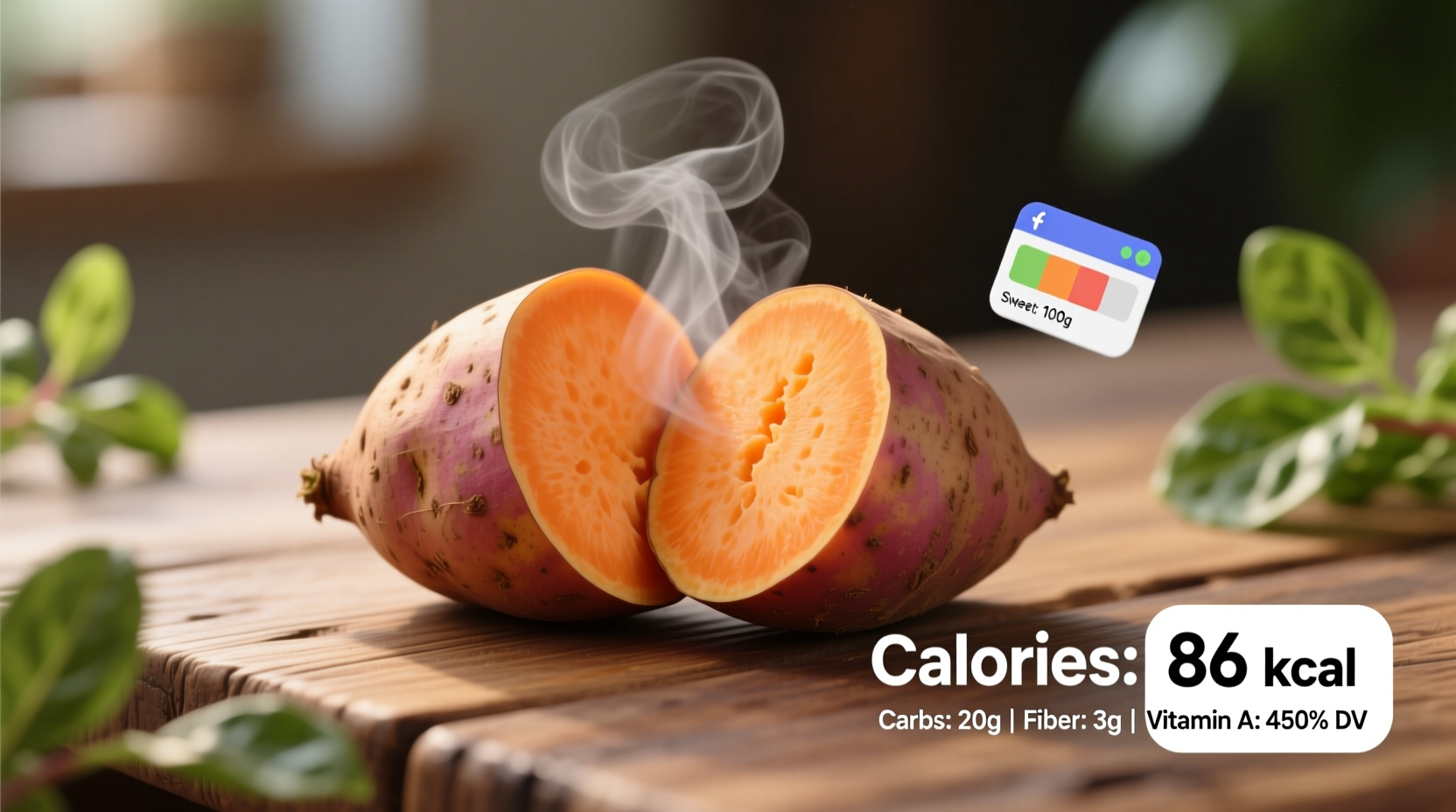When tracking your daily nutrition, knowing the precise calorie content of common foods is essential. Many people reach for sweet potatoes as a "healthy" alternative to regular potatoes but aren't sure exactly what they're consuming. Let's examine the complete nutritional profile of a small sweet potato and how it fits into various dietary plans.
Exact Calorie Count and Complete Nutrition Profile
According to the USDA FoodData Central database, a small sweet potato (130g raw, approximately 5 inches long) provides these exact nutritional values:
| Nutrient | Amount | % Daily Value* |
|---|---|---|
| Calories | 103 | 5% |
| Total Fat | 0.1g | 0% |
| Carbohydrates | 24g | 9% |
| Dietary Fiber | 3.6g | 13% |
| Sugars | 5.7g | - |
| Protein | 2.0g | 4% |
| Vitamin A | 21,907 IU | 438% |
| Vitamin C | 19.6mg | 22% |
| Potassium | 438mg | 13% |
*Percent Daily Values are based on a 2,000 calorie diet. Your daily values may be higher or lower depending on your calorie needs.
How Sweet Potato Size Affects Calorie Count
Understanding portion sizes is crucial since calorie counts vary significantly based on the actual size of your sweet potato. Here's how different sizes compare:
- Extra small (100g): 86 calories - perfect for snack portions
- Small (130g): 103 calories - standard single serving size
- Medium (180g): 142 calories - common restaurant portion
- Large (270g): 213 calories - nearly double a small sweet potato
When purchasing sweet potatoes, look for ones that are firm, smooth, and relatively uniform in shape for the most accurate portion control. Irregular shapes can make visual estimation challenging.
Raw vs. Cooked: How Preparation Changes Nutrition
The cooking method you choose significantly impacts the final calorie count and nutritional profile of your sweet potato:
- Baked (no oil): 103 calories for small potato - minimal nutrient loss
- Boiled: 98 calories - slight reduction due to water absorption
- Roasted with 1 tsp olive oil: 158 calories - additional 45 calories from oil
- Air-fried: 105 calories - negligible difference from baking
- Microwaved: 103 calories - preserves most nutrients
For weight management purposes, baking or boiling without added fats provides the most calorie-controlled option while preserving maximum nutrients. The natural sweetness intensifies when baked, often eliminating the need for added sugars.

Sweet Potato vs. Regular Potato: Nutritional Comparison
Many people wonder how sweet potatoes compare to regular white potatoes. Here's how a small sweet potato (130g) stacks up against a similar-sized white potato:
| Nutrient | Sweet Potato (130g) | White Potato (130g) |
|---|---|---|
| Calories | 103 | 113 |
| Carbohydrates | 24g | 26g |
| Dietary Fiber | 3.6g | 2.1g |
| Vitamin A | 438% DV | 0% DV |
| Vitamin C | 22% DV | 20% DV |
| Potassium | 13% DV | 15% DV |
| Glycemic Index | 50 (medium) | 78 (high) |
Sweet potatoes provide significantly more fiber and vitamin A while having a lower glycemic index than white potatoes, making them a better choice for blood sugar management. Both are excellent sources of potassium and vitamin C.
Health Benefits Beyond Calories
While calorie count matters for weight management, sweet potatoes offer substantial health benefits that make them worth including in your diet:
- Vitamin A powerhouse: One small sweet potato provides over 400% of your daily vitamin A needs, crucial for vision, immune function, and skin health
- Blood sugar friendly: Despite their sweetness, sweet potatoes have a medium glycemic index (50) compared to white potatoes (78)
- Fiber-rich: The 3.6g of fiber supports digestive health and promotes feelings of fullness
- Antioxidant properties: Orange varieties contain beta-carotene, while purple varieties offer anthocyanins
- Nutrient density: High nutrient content relative to calorie count makes them ideal for weight management
Practical Tips for Incorporating Small Sweet Potatoes
Understanding how to use small sweet potatoes effectively can help you maximize their nutritional benefits while staying within your calorie goals:
For Weight Loss
Pair your small sweet potato (103 calories) with 3-4 ounces of lean protein and non-starchy vegetables for a balanced 300-400 calorie meal. Avoid adding butter or marshmallows which can double the calorie count.
For Athletes and Active Individuals
Enjoy a small sweet potato as a pre-workout carbohydrate source 1-2 hours before exercise. The complex carbs provide sustained energy without blood sugar spikes.
Dietary Restrictions Considerations
Small sweet potatoes work well for most dietary patterns including vegetarian, vegan, and gluten-free diets. Those following low-carb or ketogenic diets should limit portions as the 24g of carbohydrates exceeds typical keto limits.
Common Questions About Sweet Potato Calories
Many people have specific questions about incorporating sweet potatoes into their nutrition plans. Here are answers to the most frequently asked questions:











 浙公网安备
33010002000092号
浙公网安备
33010002000092号 浙B2-20120091-4
浙B2-20120091-4